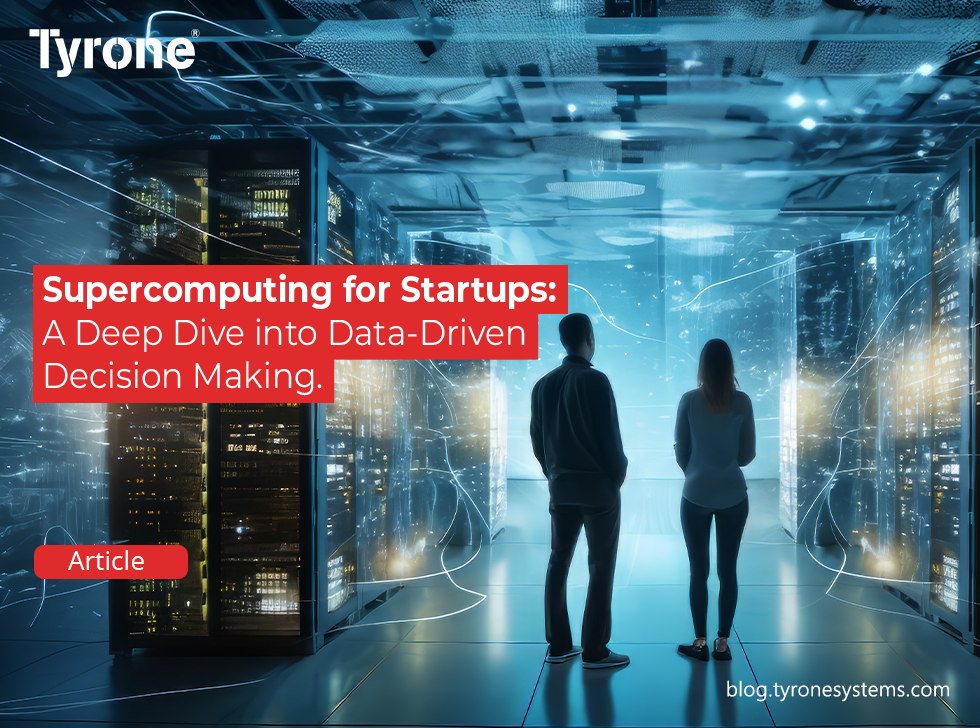Supercomputing uses powerful machines that can rapidly perform complex calculations and process large amounts of data. Supercomputers are often used for scientific research, engineering, simulation, and artificial intelligence. However, supercomputing is wider than these domains. In fact, supercomputing can also benefit startups that want to leverage data-driven decision-making to gain a competitive edge in the market.
What is Data-Driven Decision Making?
Data-driven decision-making (DDDM) uses facts, metrics, and insights to guide strategic business decisions that align with goals, strategies, and initiatives. DDDM helps startups overcome biases, assumptions, and gut feelings, instead relying on evidence and analysis to optimize their performance and outcomes. DDDM can also help startups to identify opportunities, threats, trends, and patterns in the market and test and validate their hypotheses and assumptions.

Why is Supercomputing Important for Data-Driven Decision Making?
Data-driven decision making requires collecting, processing, analyzing, and visualizing large and complex datasets, which can be challenging and time-consuming for startups that have limited resources and capabilities. This is where supercomputing can help. Supercomputing can provide startups with the following benefits:
- Speed: Supercomputing can accelerate the data processing and analysis, and enable real-time or near-real-time decision making. For example, according to the TOP500 list, the world’s fastest supercomputer is Japan’s Fugaku at a speed of 442 petaflops as of June 2021, which means it can perform 442 quadrillion calculations per second. This is equivalent to the combined computing power of about 8.7 million laptops.
- Scale: Supercomputing can handle massive and diverse datasets, such as structured, unstructured, and streaming data, from various sources and formats. For example, IBM supercomputers, Summit and Sierra, which rank second and third in the world, respectively, can store and analyze up to 250 petabytes of data each, which is equivalent to the data generated by 50 billion smartphones.
- Complexity: Supercomputing can solve complex and multidimensional problems that require advanced algorithms, models, and simulations. For example, supercomputing can enable startups to apply artificial intelligence, machine learning, and deep learning techniques to their data, and to generate insights that are otherwise difficult or impossible to obtain.
How Can Startups Access Supercomputing?
Supercomputing can be expensive and inaccessible for many startups, as it requires high upfront investment, maintenance, and expertise. However, there are some ways that startups can access supercomputing without breaking the bank. Some of the options are:
- Cloud Services: Cloud services are platforms that provide on-demand access to supercomputing resources over the internet, such as computing power, storage, and software. Cloud services can offer scalability, flexibility, and cost-effectiveness for startups, as they only pay for what they use, and can adjust their usage according to their needs.
- Partnerships: Partnerships are collaborations between startups and other organizations that have supercomputing capabilities, such as research institutions, universities, or government agencies. Partnerships can offer mutual benefits, such as sharing data, expertise, and resources, and creating synergies and innovations. Some examples of supercomputing partnerships are the National Supercomputing Mission in India, which provides supercomputing infrastructure and support to startups, and the Microsoft for Startups program, which offers free supercomputing to startups for AI development.
- Grants: Grants are funds that are awarded to startups by various entities, such as foundations, corporations, or governments, to support their supercomputing projects. Grants can offer financial assistance, as well as recognition and exposure, for startups that have innovative and impactful ideas that require supercomputing. Some examples of grants that are available for supercomputing are the NVIDIA Inception program, which provides GPU credits and technical support to AI startups, and the European Union’s Horizon 2020 program, which funds research and innovation projects that involve supercomputing.

Conclusion
Supercomputing is a powerful tool that can enable startups to adopt data-driven decision making, and to gain insights, efficiency, and competitive advantage in the market. However, supercomputing can also be costly and challenging for startups to access and use. Therefore, startups should explore the various options that are available to them, such as cloud services, partnerships, and grants, and choose the one that best suits their needs and goals. By doing so, startups can harness the potential of supercomputing and data-driven decision making, and take their business to the next level.












